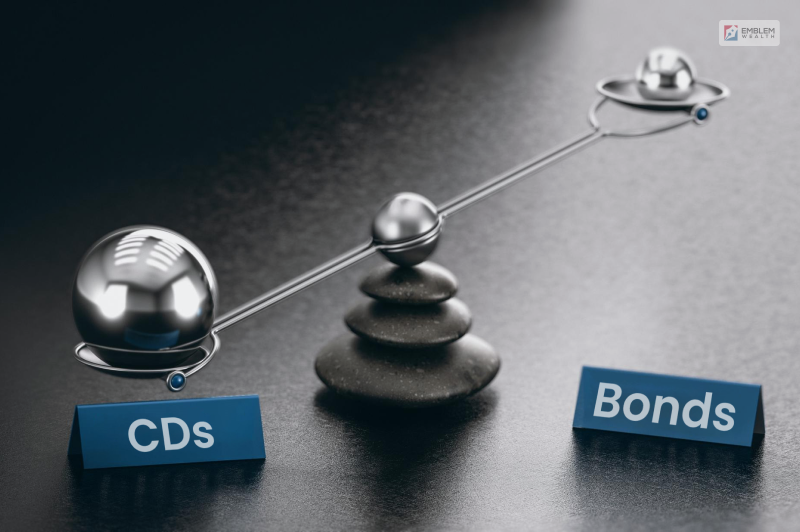CDs Vs Bonds: How Are They Different From One Another?

Both bonds and certificates of deposits are the ultimate safe haven for investments. They both offer only fair returns but carry the littlest or no risk of loss on the principal.
Both CDs vs. bonds are very similar to interest-paying loans, where the investor acts like the lender. Most investors tend to choose this option as they are slightly a better-paying alternative as compared to a traditional savings account.
However, both of them have foundational differences that make the other a better investing option than the other for certain investors.
If you are planning on investing in either of these and looking for a detailed overview, you are here at the right place. Stay with me as I unfold all the significant differences between CDs and bonds so that you can decide which one is worth your investments.
Key Takeaways
- Bonds and certificates of deposits are both famous as the safe haven for deposits as they give moderate returns with the lowest of returns.
- With high rates of interest, a CD will yield a slightly better return as compared to a bond.
- However, with low rates of interest, a bond is a high-paying investment compared to CDs.
Cds Vs Bonds: Understanding The Definitions
If you are wondering how CDs vs. bonds operate, this is how –
Certificate Of Deposits
You can get a certificate of deposit from either a bank or a credit union. They function similarly to a savings account, but they will offer the account holder a moderately higher rate of interest.
In return, the holder will have to agree to allow the financial institution that issues the CD to keep and use their funds for a set time period.
This time period can be as short as six months or as long as ten years. With an extended holding period, the account holder will be able to get higher rates of interest.
A CD is as secure as an investment can be. The Federal Deposit Insurance Corporation guarantees them up to an amount of $250,000. Therefore, even if the bank has failed, the investor can quickly regain their principal as per that limit.
However, there is one risk that an investor may face when it comes to CDs, and that is inflation.
For instance, if an investor deposits around $1,000 in a certificate of deposit for a time period of 10 years and inflation takes a rise over the ten years, the buying power of the invested $1,000 will not be the same in comparison to what it was when the investor deposited it. The interest rates of CDs increase with a rise in inflation as the bank needs to offer a comparatively better return to make CDs competitive.
Therefore, investing in a CD is a great decision when the interest rates are high. However, if you are locking money at a time when the interest rates are low, it will definitely turn out to be a wrong decision.
Precisely, a certificate of deposit is indeed a great area to store your money that you do not need without the fear that it might disappear. The worst-case scenario is if the money doesn’t grow as rapidly as inflation.
Bonds
Just like a certificate of deposit, a bond is necessarily a type of loan. The bondholder here is loaning the money to the government or corporation that is in charge of issuing the bond for a selective period of time in exchange for a specific portion of interest.
Organizations or the government issue bonds in order to raise money. High-rated bonds are just as protected from losses as the entities that are in charge of backing them. Unless it is a situation where the company has gone bankrupt, or the government has collapsed, your principal is safe and secured, and you will receive the interest that was initially agreed upon.
Also, in case a company does go bankrupt, it is always the bondholders that are paid back even before the stock owners.
Several agencies have rated bonds, and the best ones among those are Standard & Poor’s and Moody’s. Bong rating is the process by which an agency evaluates the creditworthiness of the bond issuer. Multiple investors are stern about not going anywhere below the top rating given by AAA. While lower-rated bonds pay a little more interest, they come with additional risks that a lot of investors are not prepared to take.
A critical difference between CDs and bonds rests in their reaction to the increase in the rate of interest. When the rate of interest rises, the price of bonds decreases. This means that bonds tend to lose their market value when the rate of interest goes high.
CDs Vs Bonds: Liquidity And Safety
The CD is known to be the ultimate safe-haven investment as the money that you invest is insured up to $250,000. Government bonds in the U.S. are also considered to be relatively safe. High-rated and high-quality bonds are successfully secured from literally anything but catastrophes.
However, one must remember that both CDs and bonds come with time-based commitment. You would definitely not want to invest in a long-term certificate of deposit when the rate of interest is low. Similarly, try not to invest in a long-term bond when the rate of interest is high.
Expecting that the age-old trend reverses, which it always has sooner or later, you might be landing yourself a reduced rate of return.
Both CDs and bonds are liquid investments, which means they can easily be converted back into cash. However, it can be pretty costly to liquefy either of them before their redemption date.
In the case of CDs, you may face penalties from the bank, which will eliminate the maximum or all of the earnings that you were promised, and you might also face a deduction on your principal amount.
In the case of bonds, selling them before they reach their redemption date at the wrong time will increase the risk of losing their value and forgoing the future payment of interest.
An investor who is wise will always keep the emergency funds in an account that does not charge any penalty. This undoubtedly refers to a typical savings account.
When Is The Certificate Of Deposit The Best Option?
A CD is the perfect option for investors who are against taking any risks. The NCUA or the FDIC insurance backs the CDs; therefore, investors feel confident that they will not be losing any money that they invest in the CDs.
A CD is also open to a higher level of customization, therefore they are best for achieving short-term monetary goals. A CD is excellent if an individual is saving up for the downpayment of a house or a car, as they are known to earn you a lot more interest as compared to a typical savings account.
When Is Bond The Best Option?
Investors who are more tolerant of risks are looking for greater returns and prefer investing their savings into bonds. Most of the bonds pay a stable income through coupons; therefore, they are an excellent choice for investors who are looking for a fixed stream of income.
The Bottom Line
Both CDs vs bonds are very safe and secure options and are potentially liquid, and based on their maturity, they can easily be a suitable choice for investors based on their financial goals, their access to the marketplace, and their willingness to research.
While you can get a CD from a bank or any brokerage firm, you will get bonds only from a brokerage firm or directly from the U.S. treasury website.
The returns you will get will be very moderate compared to the other tools of investments, but both are the best in offering the ultimate safety to your investments with the lowest risk compared to others.
Continue Reading:


























Leave A Reply